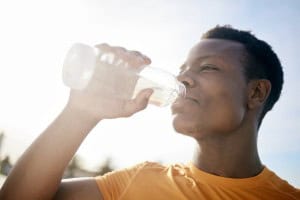The high temperatures of a Mid-South summer can be dangerous if too much exposure leads to heatstroke or another heat-related illness.
Our experts have advice that can help you and your loved ones stay safe.
Make sure to wear loose clothing, stay hydrated, and take plenty of breaks to cool down, and to get help if you or someone else experiences symptoms of heat illness.
Summer may not officially start until June 20, but for people in Memphis and the Mid-South, the heat has already arrived – and that means taking steps to reduce your risk of heatstroke.
The expert team at Regional One Health has practical advice for staying healthy and recognizing when help is needed.
“Temperatures will continue to risk throughout the summer months, and with the increased temperatures comes an increased risk of suffering from heatstroke,” said Geretta Hollins, Community Outreach and Injury Prevention Program Coordinator for Burn/Trauma Services. “Heatstroke is the most serious heat-related illness, and it can cause permanent disability or even death if the person does not receive emergency treatment.”
Signs of heatstroke include a severe headache, nausea, dizziness and fainting, confusion, rapid pulse, and hot skin. If you think you or someone you are with is suffering from heatstroke, call 911 or take the victim to the hospital immediately.
Hollins explained heatstroke occurs when the body can no longer control its temperature.
Body temperature rises rapidly and the sweating mechanism fails, leaving the body unable to cool itself down. Your temperature can rise to 106 degrees or higher within 10 to 15 minutes.

Drinking plenty of water keeps you hydrated, allowing the body to sweat in order to maintain a normal temperature.
Fortunately, “Heatstroke is preventable,” Hollins said. “Prepare yourself for the upcoming hot and humid days and nights of summer so you can keep yourself and your loved ones safe.”
Wearing loose-fitting, lightweight clothing helps your body regulate temperature. “Excess clothing or clothing that fits tightly won’t allow your body to cool properly,” Hollins explained.
Stay hydrated by drinking plenty of water, sports drinks and other hydrating beverages. This will help your body sweat so you can maintain a normal body temperature.
Take it easy during the hottest parts of the day, like late morning through early afternoon. “If you can’t avoid strenuous outdoor activity due to work or other commitments, make sure you drink plenty of fluids and take regular breaks to rest indoors or in a shaded spot,” Hollins said. “Try to plan exercise or physical work for cooler parts of the day, such as early morning or evening.”
It’s also helpful to acclimate your body slowly.
Hollins said you can start by working or exercising in the heat for a limited amount of time. As you get used to it, you can increase your time and activity steadily but slowly.
“People who are not used to hot weather are especially susceptible to heat-related illness,” she explained. “It can take several weeks for your body to adjust to hot weather.”

Never leave a child unattended in a vehicle. Temperatures inside a vehicle parked in the sun can rise 20 degrees in just 20 minutes, which can cause the child to suffer heatstroke within a matter of minutes.
It’s also important to protect your loved ones from heat illness.
“Every year, we hear stories of children left alone in a parked car,” Hollins said. “If your car is parked in the sun, the temperature inside can rise 20 degrees in just 20 minutes…and a child left inside could suffer heatstroke within a matter of minutes. This is a common cause of heat-related deaths among children, but all hot car deaths are preventable.”
Never leave a child or pet in a vehicle unattended, even if the windows are partially open, the engine is running, or the car is parked in the shade. Look in the back seat every time you exit the car. When your car is parked, keep it locked to prevent a child from getting inside.
Hollins said everyone should pay attention to their risk from the heat – especially those who are at higher risk due to age, health conditions, high activity level, or another reason.
“If you take medications or have a condition that increases your risk of heat-related problems, avoid the heat and act quickly if you notice symptoms of overheating,” she said. “If you participate in a strenuous sporting event or activity in hot weather, make sure there are medical services available in case of a heat emergency.”